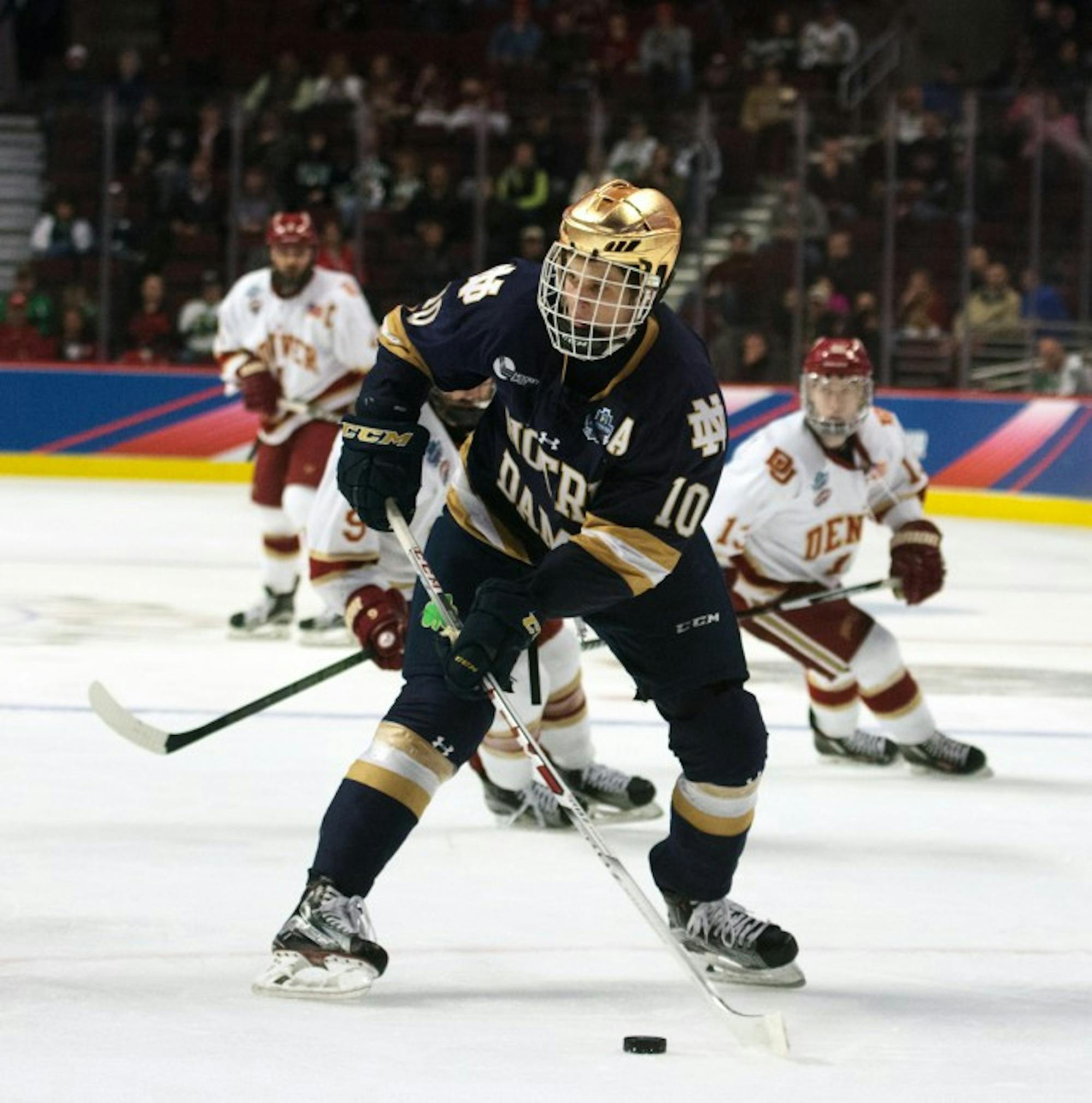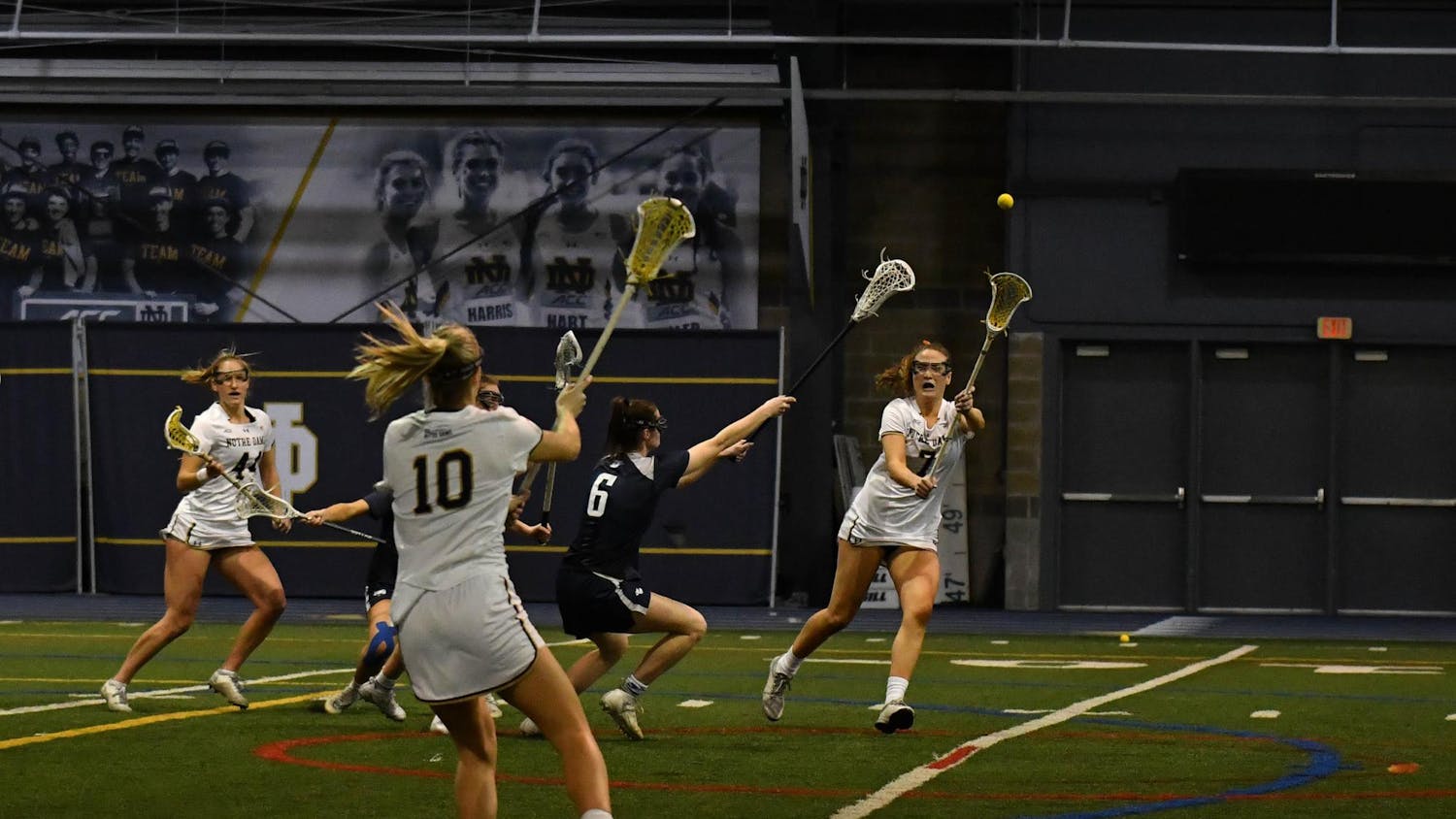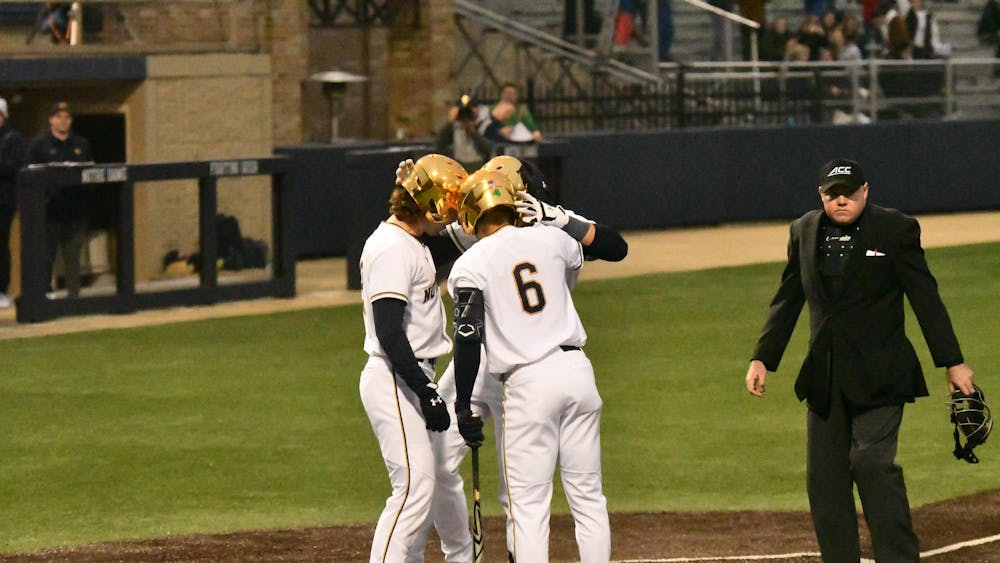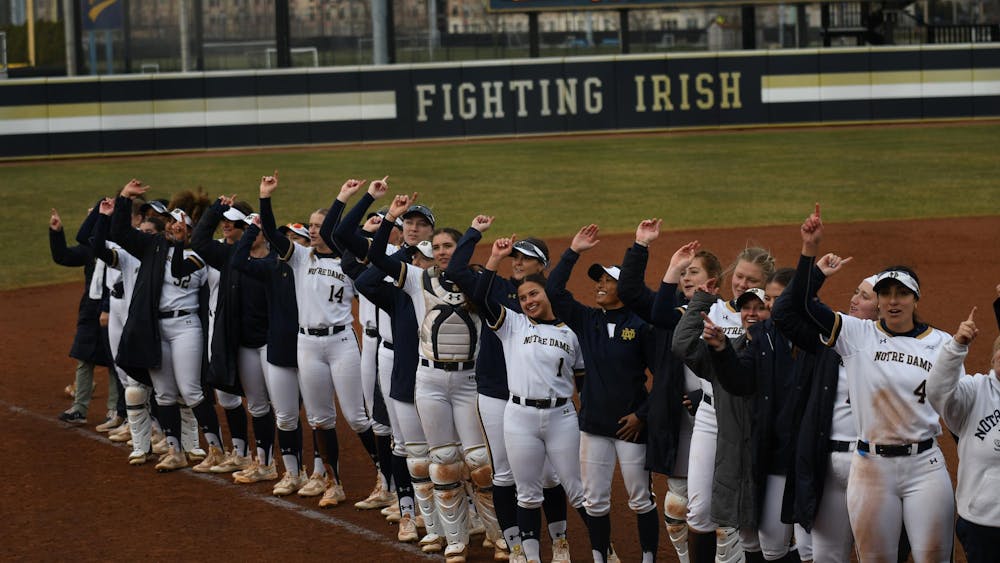Coming into the 2016-2017 season, there were a lot of question marks surrounding Notre Dame. Fresh off a first-round exit from the NCAA tournament to Michigan, the team came into this season with only two seniors on the roster, backup goalie Chad Katunar and reserve forward Ben Ostlie.
For head coach Jeff Jackson however, the expectations were high from the get-go.
“It was a year in which we had a younger group, especially on the back end, where we had four underclass defensemen, and we had a number of underclass forwards too,” Jackson said. “It was a younger group, and there’s always enthusiasm with them. So expectations were always high when we started the season, and I think we were a little inconsistent in the first half of the year, probably because of that youth and the inexperience, but I think we settled down and really came into our own in the second half.”
Jackson’s trust in the youth was evident from the beginning, as he named junior goalie Cal Petersen captain, along with three other juniors — forwards Anders Bjork and Jake Evans and defenseman Luke Ripley — as assistant captains.
“Seniors are always good to have, as far as from a experience standpoint and a leadership standpoint, but our junior class has been pretty solid over the past three years, and I think a number of guys, including Cal and Anders, took a big step,” Jackson said of the junior class taking on the challenge. “We had a number of guys in that class that I thought did a good job of stepping up and taking on the leadership role.”
The first months of the season were rocky, however, as the relatively inexperienced Irish (23-12-5, 12-6-4 Hockey East) were baptized by fire with games against NCAA tournament teams Minnesota Duluth, Penn State and Hockey East rival UMass Lowell. After opening the season with a convincing sweep of Arizona State, the Irish struggled to stay consistent, failing to sweep another opponent over the first half of the season. For every good win — like a 3-1 win over Duluth on Oct. 15 — there was a bad loss — like the 5-4 loss to Hockey East bottom-dweller Massachusetts on Dec. 2.
But there were still inklings of greatness. Coming up against then-No. 3 Boston College, who was undefeated in conference play, on Dec. 10, Notre Dame came back from a 2-0 deficit to win 3-2. On one end, Petersen made several huge saves for the Irish to keep them in the game, and on the offensive side, Bjork dazzled with two goals, including the game-winner, to give the Irish a huge win.
Fresh off the confidence booster, Notre Dame came back from winter break with a renewed focus, and things started to turn around. The Irish began playing competitively in every game, and, more importantly, winning the games they were supposed to win. Although they lost to Boston College (21-15-4, 13-6-3) 6-4 on Jan. 28, it was the moment it finally started to click for the team, according to Jackson.
“I thought we got some confidence in the last game of the first half against Boston College, and we came back in January with an improved mindset as far as being able to do the things that were going to help us win,” Jackson said. “After that second game at Boston College, I think that’s where the light switch totally went on, and they recognized how they had to play to be successful.
“ … We had a number of [good games] as we progressed during the second half — we had some tough wins against Vermont and Providence, and I think that’s where we really started to think that we could potentially do some damage in the NCAA tournament or even in the Hockey East Playoffs.”
The Irish only lost three games over the final months of the season but headed into the Hockey East tournament still looking to cement their position in the NCAA tournament. Facing them in the quarterfinals was Providence (22-12-5, 12-7-3), a team that had been one of the hottest in the country over the final stretch of the season, winning nine straight before playing the Irish on Feb. 17. Notre Dame managed to win and draw that two-game series earlier in the season, but the Friars were hoping to get revenge.
Led by their two stars in Petersen and Bjork, however, the Irish played some of their best hockey all season with convincing 5-0 and 5-2 wins. For Jackson, the Irish had all the right pieces, it just took some time to get everything on all cylinders.
“Our team was very close, but I think they came to grips with how they had to play in order to win, and especially against really quality programs,” he said. “We probably played a bit more risky in the early stages of the season, and I thought we played with a lot more poise and just doing things that helps you win games — not taking unnecessary penalties, not turning the puck over in dangerous areas on the ice, our special teams did a pretty good job and, obviously, we had good goaltending with Cal, so obviously we had all the right ingredients and it was just a matter of taking care of the details of the game to really be a successful team.”
In the semifinals, however, the team slipped up against UMass Lowell (27-11-3, 14-7-1), losing 5-1 at TD Garden in Boston. It was a difficult loss that Jackson in part attributed to the factor of playing with a young team in a big venue. But its record was good enough to earn a No. 4 seed in the tournament, sending Notre Dame to Manchester, New Hampshire, for a chance to make the Frozen Four.
Coming up against top-seeded Minnesota in the first game, the Irish came back to win, 3-2, thanks to two goals from Bjork. The Irish then came up against UMass Lowell again, with a trip to the Frozen Four on the line. Despite being blown out only a week before, Notre Dame battled throughout the game to eventually win in overtime off a Bjork feed to sophomore forward Andrew Oglevie, who buried his shot past the goalie to send Notre Dame to its third Frozen Four in program history.
“Our team had been playing real well, and the youth and inexperience from the first half I think showed up under the bright lights and in the big buildings, against UMass Lowell in the Boston Garden,” Jackson said on the turnaround. “But our team had been playing extremely well, and then going into Manchester [for the NCAA regional], that was probably like a more typical college building, so I thought our team played really well and very similarly to how we had been playing prior to that game against Lowell, and we played two high-quality opponents, and I think we showed that we could certainly play against Lowell and have success. And we were very fortunate in that game to win in overtime, but it was certainly a much better performance by our team against Lowell in that championship game of the Northeast regional.”
Heading into the Frozen Four as the only non-No. 1 seed, the Irish were the underdogs but were happy to take on the role as the host team, with the games being played at the United Center in Chicago. But the Irish hit a roadblock in top-ranked Denver, who had been knocked out of the Frozen Four a year prior and were a team on a mission. The Pioneers (33-7-4, 20-4-3) dominated the Irish 6-1 on their way to the title, and for Jackson, the Irish can take a page out of that book in growing from a valuable experience.
“I think this past year was certainly a good stepping stone for this group, especially our sophomore and junior classes, but also our freshman class, which I think is going to blossom,” Jackson said on the future. “We have a bright future, and we had to go through some of those rough spots like at the Boston Garden and in Chicago to figure things out and recognize that we need to play our game regardless of the venue, and regardless of the opponent, and we certainly have the quality of players coming back and some good freshmen coming in that will hopefully make us take an even bigger step heading into next season.
“ … As a freshman, I think [defenseman] Andrew Peeke and [forward] Cam Morrison both took big steps in the second half [of the season], as did [forward] Cal Burke. Overall, on the season I thought [sophomore forward] Andrew Oglevie took the biggest step of anyone; as the season went on, he continued to be an extremely impactful player in our lineup. We had a number of guys who had good years, and hopefully there’s still a lot more left in some of them.”
Part of the growth in the young forwards can be attributed to Bjork, who led the Irish in goals and assists, as well as being named co-MVP alongside Petersen.
“Anders, more so by an example, was a guy who could show the younger guys how hard you have to work in the weight room and how seriously you have to take the game,” Jackson said on Bjork’s leadership. “He’s a pretty humble kid, so what he did off the ice in community service, I think just the overall impact of him doing things the right way and showing guys what it takes to be a good athlete but also a good person, and I thought that he was somebody for our younger guys to watch and learn from.”
Looking ahead, the Irish move from the Hockey East to play in the Big Ten next year, which will pose a new test for the team.
“I think it’s going to be another challenge for us in that in the first few years of the conference, there were some great teams that were having some down years, and now with some coaching changes and the history of some of the programs, [things are changing],” Jackson said. “Wisconsin is on its way back to being a power program, Michigan has always been one and Michigan State will become one, and so the conference is going to be tough.
“ … They’ve done a great job at Penn State, building that program, and Ohio State has been a much improved program over the last few years under [head coach] Steve Rohlik, and I think that the conference will certainly be one of the best in the country next year and certainly moving forward. The travel will be better for us, and I think it will be better for our fans — just the identity of the teams we’re playing against will be more recognizable to the casual fan.”
Another question that remains is the future of Bjork and Petersen, who both could sign for their respective NHL teams this summer. While Jackson is hopeful the duo will stay, he feels the Irish should still be able to be competitive next year regardless.
“I know they’re both seriously considering returning for their senior season, and I think a big reason is first of all, they value the education at Notre Dame, but probably more importantly the relationship with their teammates and the potential that this team could have next year and the drive and desire to try and win the first-ever national championship in hockey for Notre Dame is an incentive for them to possibly return,” Jackson said. “They have to obviously be concerned about their own pro careers down the road, but frankly, I think if they approach it the right way, they can certainly continue the path of development to eventually play in the National Hockey League from Notre Dame.”
“ … If they return, it will certainly give us a much better opportunity to be a great team. I think we have good ingredients regardless, but those two guys are obviously the cornerstones for a program this past year and certainly would be next year.”













